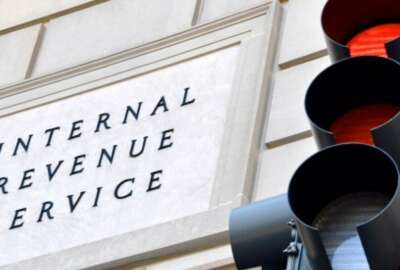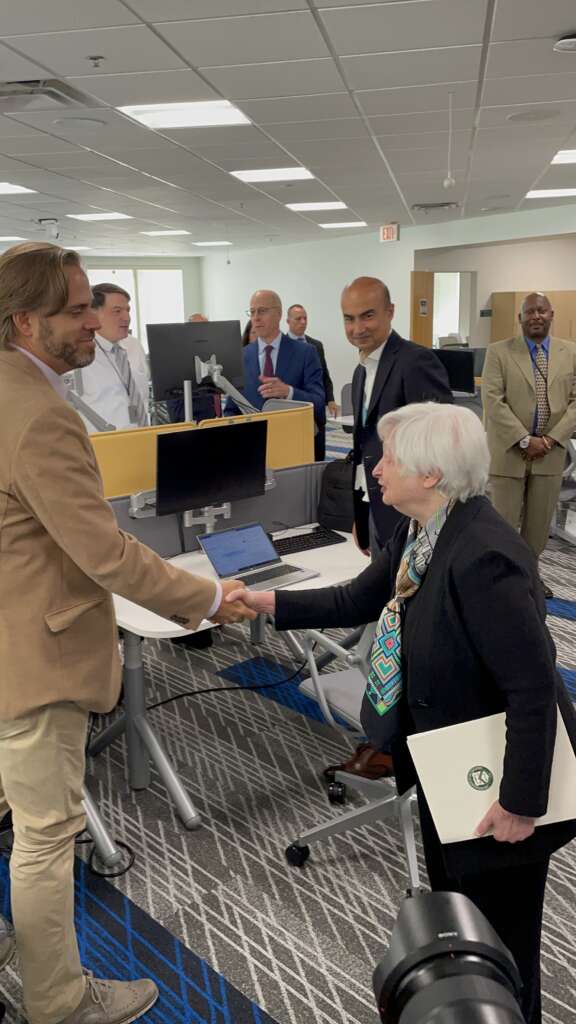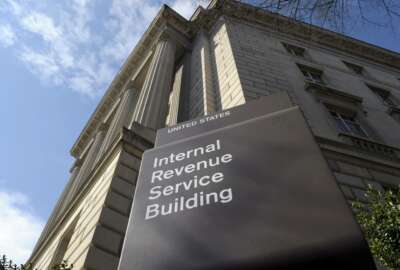

Treasury Secretary Janet Yellen outlined “bold commitments” the IRS will make over the next six months to build out its workforce and upgrade its IT...
The IRS is setting goals to provide a much higher level of service to taxpayers during next year’s filing season, now that the agency has the resources it needs to build out its workforce and upgrade legacy IT systems.
Treasury Secretary Janet Yellen on Thursday outlined “bold commitments” the IRS will make over the next six months to build out its workforce and upgrade its IT capabilities, adding that the agency will have additional opportunities to grow in the coming months and years.
Yellen told IRS employees at an agency office in New Carrollton, Maryland that the agency will staff up and modernize its IT ahead of next year’s filing season to assist more taxpayers over the phone, in person and online than what has been possible in recent years.
The Inflation Reduction Act that President Joe Biden signed into law in August gives the IRS $80 billion to spend over the next 10 years to rebuild its workforce and complete long-deferred IT modernization projects, after more than a decade of belt-tightening.
“We can do better and must do better. The Inflation Reduction Act finally provides the funding to transform the IRS into a 21st-century agency,” Yellen said. “While all the improvements won’t be done overnight, taxpayers can expect to feel real differences during the next filing season.”
Yellen said the IRS will staff up call centers to provide at least an 85% level of service next filing season, and will cut the average hold time for taxpayers on the phone in half, to less than 15 minutes.

The IRS during the most recent filing season had a 10-15% level of phone service, meaning employees answered less than two out of every 10 incoming calls.
The agency will achieve a more than fivefold increase in the number of calls it can answer in the most recent filing season by hiring an additional 5,000 call center representatives by the end of the year.
Funding from the Inflation Reduction Act will also allow the largely paper-based IRS to “move into the digital age,” Yellen said, by allowing it to automate the scanning of millions of individual paper returns into a digital copy.
“For taxpayers, this means faster processing and faster returns,” Yellen said.
The IRS, since the start of the COVID-19 pandemic, has faced a major backlog of paper tax returns that take longer to process than electronically filed returns.
The IRS, as part of its modernization initiative, will also build out its online capabilities to allow taxpayers to fully interact with the agency through its website.
Yellen said these improvements will give taxpayers the option to resolve tax issues more quickly, and may reduce the need to call the IRS to seek assistance.
“Currently, when taxpayers receive a notice from the IRS, they generally must respond via mail. During this coming filing season, millions of taxpayers will be able to receive and respond to notices online,” Yellen said.
Yellen said the agency will fully staff all Taxpayer Assistance Centers nationwide in time for next year’s filing season, which she said have been “massively understaffed and under-resourced” in recent years.
The fully staffed Taxpayer Assistance Centers are expected to assist at least 2.7 million taxpayers next filing season, more than triple the volume the level of assistance they provided to the public last year. Yellen said the IRS will also stand up a team dedicated to “resolving issues that arise when processing returns for taxpayers.”
Yellen said the IRS will hold meetings with private-sector customer service experts to consult on its taxpayer modernization efforts.
“We recognize the customer service in the future will look different than customer service today, and consulting these experts and employees at the IRS will help us sketch out our vision of what the IRS of the next decade looks like,” she said.
The IRS budget, since 2010, has shrunk by about 18%, which Yellen said has had a “severe impact on the size of the IRS workforce.”
“Because of this, the IRS has had to scrape to get by,” Yellen said.
The current IRS workforce is on par with staffing levels from the 1970s, even though the number of taxpayers and the agency’s workload has increased significantly over the decades. The IRS also currently has fewer auditors than at any time since World War II.
“Long-term modernization often has to be cast aside to give employees bandwidth to address more immediate and urgent project projects,” Yellen said. “Facing uncertain budgets year after year, the IRS is often forced to freeze external hiring, or otherwise face risks that they cannot pay who they hire. And this leads to delays for the American people and a reduced level of service. The American public and you deserve an IRS that meets its expectations in a modern society.”
The IRS will also beef up its enforcement operations to shrink a growing tax gap between what taxpayers owe, and what the IRS can collect.
Yellen said the tax gap is estimated to be $7 trillion uncollected over the next decade, and that high-income earners account for a significant portion of those unpaid taxes.
Yellen said the IRS will be able to collect hundreds of billions of dollars of additional revenue through its enforcement operations over the next decade.
“Since the IRS has lacked the resources to effectively audit high earners, whose audits are more complex and take more time, these high earners are responsible for a disproportionate share of these unpaid taxes,” Yellen said.
Yellen said that the top 1% of U.S. earners accounted for an estimated one-fifth of unpaid taxes in 2019, about $160 billion in total.
“Funding will go toward auditing more high-earners who have not paid their full bill,” she said.
However, Yellen said that tax compliance and enforcing laws “is not just as simple as it was a few decades ago,” noting that the average tax return for large corporations can reach up to 6,000 pages.
Yellen said this added IRS resources will not increase the audit rate for households that earn less than $400,000 a year, and that the audit rate for taxpayers in compliance will decline “once the IRS has the right technological infrastructure in place.”
“That means a simpler tax season for taxpayers who are doing everything right,” Yellen said.
Former IRS executives expect agency funding in the Inflation Reduction Act will reduce the rate of “no-change audits” it conducts, in which the IRS determines that the taxpayer under audit does not owe any additional taxes.
“With your help funding from the inflation Reduction Act will go toward correcting this two-tiered tax system, where high earners play by different rules than working and middle-class families,” Yellen said.
Copyright © 2024 Federal News Network. All rights reserved. This website is not intended for users located within the European Economic Area.
Jory Heckman is a reporter at Federal News Network covering U.S. Postal Service, IRS, big data and technology issues.
Follow @jheckmanWFED



